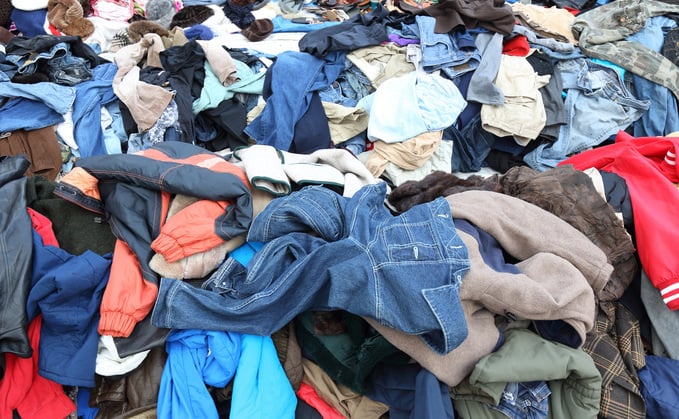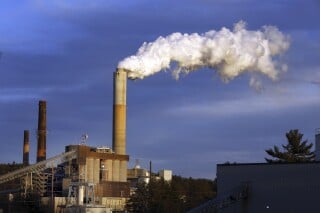
Zara, H&M, Primark and IKEA launch textile waste pilot
What's going on in the world of ESG, CSRD, CSDDD, SDGs etc...
1. GLOBAL STOCKTAKE FINDS WILDLIFE DOWN 73% IN 50 YEARS
Human activity is continuing to drive a "catastrophic" loss of species. The Living Planet Report, a broad overview of the state of the natural world, reveals global wildlife populations have shrunk by an average of 73% in the past 50 years.
From elephants in forests to turtles off the Great Barrier Reef, the natural world is dying.
Nature loss and climate change are pushing the world towards irreversible tipping points, including the potential collapse of the Amazon rainforest, whereby it can no longer lock away planet-warming carbon and mitigate the impacts of climate change..
Please don't just feel sad about the loss of nature, be aware that this is now a fundamental threat to humanity, and we've really got to do something now.
2. CEOS CALL FOR HIGHER CARBON PRICES AHEAD OF COP29
More than 100 executives are imploring policymakers not to renegade on climate spending plans, and stating that there is widespread private sector support for more progressive legislation and regulation despite noise from detractors.
The call to action is coming from the Alliance of CEO Climate Leaders, whose members collectively generate $4trn in annual global revenues. Member firms include Ikea, Nestle, Mastercard, Bayer, ArcelorMittal, Tata Steel, Volvo Group, Sony, Dell and AP Moller-Maersk.
Other calls to action include:
- Expanding the use of mandatory carbon pricing.
- Phasing out fossil fuel subsidies.
- Streamline planning for clean energy projects.
- Integrating climate into risk planning.
If not now, when?
3. BANKS MAINTAIN COAL INVESTMENTS DESPITE CLIMATE PLEDGES
The ‘State of Transition in the Banking Sector’ report from the Transition Pathway Initiative (TPI) Centre revealed 85% of major banks remain willing to finance new coal projects. None have pledged to phase out coal financing in alignment with the 1.5C.
TPI evaluated 38 international and US banks, and the key findings show that 85% of banks still finance new coal projects. None have committed to phasing out coal financing to meet the 1.5C global warming limit.
Only 8% have pledged to stop project financing for new oil and gas fields, and none have committed to end all financing for deforestation activities by 2025.
Someone needs to step outside and smell the fear in the air. Ask Milton. This is not good.
4. BP ABANDONS GOAL TO CUT OIL OUTPUT, RESETS STRATEGY
BP has abandoned a target to cut oil and gas output by 2030 as CEO Murray Auchincloss scales back the firm's energy transition strategy to regain investor confidence.
BP’s 2020 strategy was the sector's most ambitious company with a pledge to cut output by 40%. In 2023 BP scaled that reduction back to 25% to focus on near-term financial returns rather than transition.
The company is now targeting several new investments in the Middle East and the Gulf of Mexico to boost its oil and gas output.
“We are going to deliver as a simpler, more focused, and higher value company," a BP spokesperson said.
“ …and to hell with the planet.” Our words not theirs.
5. NETHERLANDS SUED BY EXXON OVER CLOSURE OF LARGEST GAS FIELD
ExxonMobil has invoked the Energy Charter Treaty (ECT) in a potential multi-billion claim – to pressure the Netherlands’ new right-wing government for closing Europe’s largest gas field in Groningen.
Exxon’s claim appears to be prompted by the government change, after PM Mark Rutte lost his mandate after a 2023 swing to the right.
“It is our view that the previous government had no intention of reaching an amicable settlement,” [Rutte’s government has taken] “unilateral measures that arbitrarily disadvantaged ExxonMobil as an investor”
The massive claim shows the ruthlessness and greed of Exxon. It is a warning too to other ECT countries, showing how the ECT is incompatible with a climate change agenda.
6. UBER PROMOTES NEW EV INITIATIVES TO RIDERS AND DRIVERS
Uber has partnered with Octopus Energy and BYD to make the transition to electric vehicles (EVs) more affordable to drivers, and launched new digital features to further promote electrification to drivers and customers alike.
Uber is aiming to be a zero-emission mobility platform globally by 2025. It has partnered with automaker BYD and energy retailer Octopus to provide a free home charger to 1,000 Uber drivers. These drivers will also get an 8% discount on public EV charging on the Octopus Electroverse network.
More than 180,000 Uber drivers globally have already chosen an EV, meaning that one in five Uber miles travelled globally are electric.
Uber riders will be able to use a new ‘EV preference’ feature to set their app to match with an electric car anytime one is nearby.
7. ZARA, H&M, PRIMARK, AND IKEA TO LAUNCH TEXTILE WASTE PILOT
Spain’s largest fashion companies, including Zara owner Inditex, H&M, Decathlon, Ikea, and Primark, will start collecting discarded clothes in April next year as part of a voluntary pilot scheme called Re-viste.
This initiative aims to manage textile waste ahead of EU regulations set to take effect in 2026.
Re-viste will separate textiles and shoes from other waste collection, with dozens of containers set up across Spain in churches, stores, shopping centres, and streets.
The goal is to reuse or recycle discarded clothing, which currently sees only 12% separated from landfill waste. During the year-long trial, companies will bear the cost of managing textile waste.
8. 200 AFRICAN WOMEN FOOLED INTO BUILDING RUSSIAN WEAPONS
Russia put out ads promising young African women a free ticket, money and adventure. But, instead of a work-study program in hospitality, some learned after arriving in Russia’s Tatarstan region that they would be making weapons of war, assembling attack drones to be launched into Ukraine.
Some of Moscow’s key weapons production is now in the inexperienced hands of about 200 African women working alongside Russian vocational students.
The Kremlin has recruited young women from places like Uganda, Kenya, South Sudan, and Nigeria. The women complain of long hours, constant surveillance, broken promises about wages and areas of study, and of working with caustic chemicals.
There is so much wrong with this.
9. KEY EXEC IN VOLUNTARY CARBON MARKETS INDICTED FOR FRAUD
One of the biggest names in the VCM, Kenneth Newcombe, formerly CEO of C-Quest Capital and board member of carbon verifier Verra, was indicted over claims he manipulated data to attract more than $100 million in carbon offset investments to C-Quest. He could face up to 20 years in prison if found guilty.
Verra say they suspended the 27 affiliated projects and are working with the new people at C-Quest to cancel the credits.
This market has been rotten to the core, and behaviour like this has done tremendous damage to anyone with bona fide intentions in carbon sequestration projects.
Increased regulation, licensing and effective governance are clearly needed.
9. ISSB SECTOR SPECIFIC STANDARDS LEADS TO DOUBLE MATERIALITY?
The CFO Platform of the European Round Table for Industry (ERT) has written to EU Commissioner Mairead McGuinness asking the EU not to "reinvent the wheel" on sector specific ESRS, and to take "on board the SASB standards”. They argue that SASB (now part of ISSB) already has sector specific standards, so it makes sense to start there. The problem of course is that, unlike ESRS, SASB/ISSB does not have double materiality.
McGuiness says the EC is committed to "achieving and maintaining a very high degree of interoperability" and says that the interoperability guidance, from EFRAG / ISSB shows companies reporting under ISSB have "very few additional reporting requirements" to comply with ESRS.
In other words, just do Double Materiality! :-)


